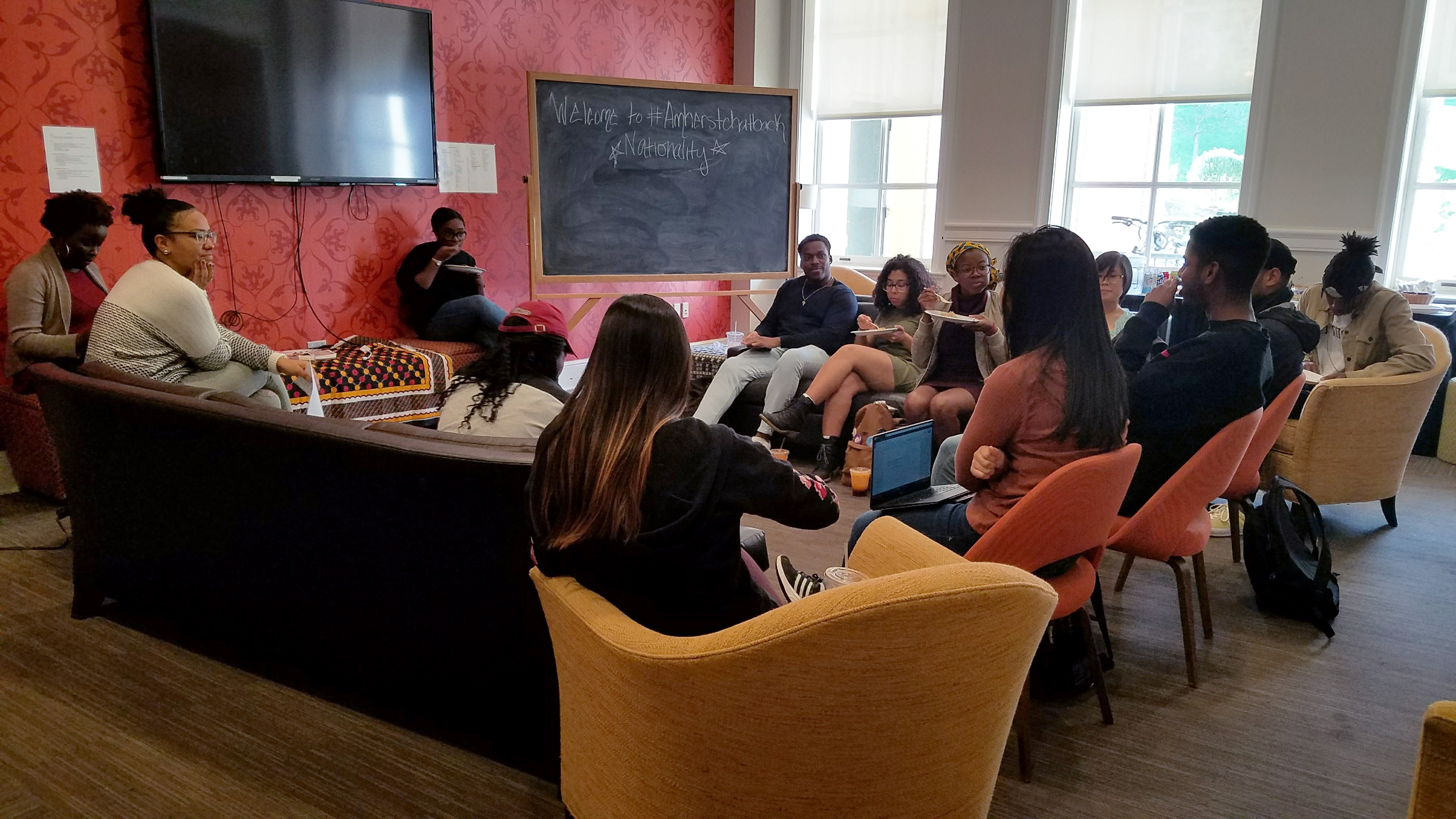

The Office of Diversity and Inclusion (ODI) is holding a new series titled “AmherstChatBack: Dialoguing Across Difference” to provide a space for students to talk about differences and intersections in their lives. Co-facilitated by Dialogue Coordinator Ismaris K. Ocasio and Race, Gender and Sexuality Education Specialist Babyface Card in Keefe Campus Center, the first dialogue took place on Sept. 29 while the most recent dialogue on Friday, Oct. 27 — the fifth of seven — addressed nationality. Past topics have included class, gender, ability and sexuality.
According to Ocasio in a separate interview, “The hopes originally with the Chatbacks were that we would focus on … talking about these things through an intersectional lens in a way that’s focused on dialogue, not debate.”
“So, how are we actually exchanging ideas, how are we gaining new perspectives and how are we learning from each other about these topics of oppression without it being heady or confrontational or frustrating?” Ocasio said.
Through these dialogues, students have the opportunity to learn how to communicate across social and cultural differences, Ocasio added.
“There is also a need on campus to talk about singular forms of oppression,” Card said in an interview after the event.
“The people, the students [on campus] often talk about oppression as a whole a lot, but they don’t necessarily have the space to talk about certain topics as they intersect with others,” Card said. “So, I think that students really appreciate this space because it is a Friday afternoon, and I think that us being facilitators create a space that is safe considering that we are staff, but we are closer … to the age of the students.”
The fifth dialogue kicked off with student introductions, after which Ocasio and Card played a video of Uzo Aduba, an actress famous for her role in TV show “Orange is the New Black” talking about how she used to be ashamed of her Nigerian name. One day, she asked her mother if she could change her name from Uzoamaka to Zoe. Her mother replied, “If they can learn to say Tchaikovsky, and Michelangelo and Dostoyevsky, then they can learn to say Uzoamaka.”
Using the video as a starting point, students talked in pairs about their reactions and where they thought the discussion would go.
After regrouping, students shared about their conversations.
Most students said they had experienced times when they were insecure about their names or wanted to change their names to ones that were more common and easier to pronounce. They also expressed frustration that names held so much power and had the potential to determine a person’s job prospects.
Irisdelia Garcia ’18 shared her experience “about [people] seeing my name on paper, Irisdelia, and thinking, ‘Oh, Latinx descent, probably from “x, y, z” places,’ when really I was born here. So, what does it mean for people to subscribe to your nationality?”
After talking about students’ personal struggles with their given names and their intersections with nationality, the conversation moved to assimilation.
“What are some of the costs that come with assimilation?” Ocasio asked. “… For future generations and the people who come after us, what happens if we just start to whitewash our names … for the benefit of survival and getting jobs?”
Assimilation happens at the cost of others, Natalia Dyer ’18 said.
“It’s kind of like, you have done this better than them, so therefore you have assimilated and they have not,” she said. Regarding the loss of one’s culture, she added, “Once you go down a path … I feel like it probably wouldn’t just stop at names.”
Ocasio also brought up the label of “cultural colonization” — colonization carried out by those who have already assimilated and judge those who come after them from other nations.
Students then split up into four groups to discuss the intersections of nationality with language, religion, social interactions and cultural norms and practices. After group discussions, they came back together to share their ideas.
On language and its intersection with nationality, a common theme was how language could act as a barrier. Many discussed how institutions mark those who can’t speak English fluently as different or or often give up on them completely.
Sometimes in schools, Amal Buford ’19 said, “The staff … don’t understand why. They think that the kid is just being lazy, that they don’t give enough effort in school.”
“It’s a misconception, because they come [to America and] their parents don’t speak English, so it’s very hard for them to try and communicate in English to their parents when their parents — all they know is Spanish,” Buford said. “And then they go into the school system, and then they’re treated as lazy kids.”
After the panel, Residential Life Program Coordinator Caryce Tirop ’17, who attended the event, said, “It’s important to have … more global conversations because it’s so easy to be American-centric.”
“I just feel like Amherst has always prided itself on having a significant international student population, and I just think it’s high time to walk that talk,” she added.
Card said that the ODI hopes to “open up [the discussions] to staff and faculty, probably starting next semester.”
“I think that it would be a great opportunity for students to be able to dialogue with staff and faculty in this space,” Card added. “I think that we often put staff and faculty into spaces by themselves and talk about the institution … which does not allow [them] to really understand what students are going through and what students want to talk about.”
The next chatback is set to take place on Friday, Nov. 3, in the McCaffrey Room at 2 p.m. and will focus on race.